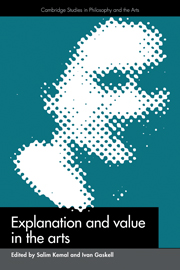Book contents
- Frontmatter
- Contents
- List of contributors
- Editors' acknowledgments
- 1 Interests, values, and explanations
- 2 Fiction and reality in painting
- 3 Franz Kafka: the necessity for a philosophical interpretation of his work
- 4 On relocating ethical criticism
- 5 Explanation and value: what makes the visual arts so different, so appealing?
- 6 Is art history?
- 7 Objectivity and valuation in contemporary art history
- 8 Fullness and parsimony: notes on creativity in the arts
- 9 Principles of a sociology of cultural works
- 10 Althusser and ideological criticism of the arts
- 11 Film, rhetoric, and ideology
- Index
4 - On relocating ethical criticism
Published online by Cambridge University Press: 24 February 2010
- Frontmatter
- Contents
- List of contributors
- Editors' acknowledgments
- 1 Interests, values, and explanations
- 2 Fiction and reality in painting
- 3 Franz Kafka: the necessity for a philosophical interpretation of his work
- 4 On relocating ethical criticism
- 5 Explanation and value: what makes the visual arts so different, so appealing?
- 6 Is art history?
- 7 Objectivity and valuation in contemporary art history
- 8 Fullness and parsimony: notes on creativity in the arts
- 9 Principles of a sociology of cultural works
- 10 Althusser and ideological criticism of the arts
- 11 Film, rhetoric, and ideology
- Index
Summary
Invited to “discuss ethical criticism in the light of responses to my book The Company We Keep,” I was naturally tempted by the glorious opportunity to give the more careless among my readers a public lashing. Like most authors, I've been puzzled, and sometimes angered, by a fair number of grotesque misconstruals. But it will be more profitable here to ignore the blind and the halt and turn, instead, to explore what it might mean that the great majority of reviewers have chosen to embrace the project, if not the details, of my effort to rehabilitate ethical criticism.
I had thought, as I began writing the book in the mid-seventies, that the critical world, busy with its attacks on authors, intentions, referentiality, and any form of closure, would be generally hostile to my project. Friends confirmed my expectation: “It's really courageous of you to take up such an unfashionable cause. You'll be crucified.” Our predictions of hostile responses were based, at least in part, on two dogmas inherited from mid-century and seemingly still dominant then. On the one hand most practicing critics had been graduate-schooled to believe that all practical questions – ideological, ethical, political – are irrelevant to our appraisals of artistic worth: the surest sign that a critic had been badly educated was any hint that judgments about “life” could intrude on aesthetic judgment. Though critics were everywhere beginning, once again, to ferret out the political origins and intents of literary works, everybody but Kenneth Burke and a few Marxists and feminists seemed still convinced that the domain of the “aesthetic” was immune to all practical questions.
- Type
- Chapter
- Information
- Explanation and Value in the Arts , pp. 71 - 93Publisher: Cambridge University PressPrint publication year: 1993
- 1
- Cited by



